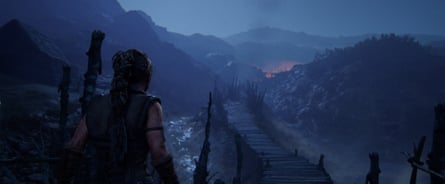Return to Senua: Hellblade’s Melina Juergens on reprising a role she never thought she’d play
‘I hope people can relate to Senua,” says actor Melina Juergens, who plays the lead character in Senua’s Saga: Hellblade II, the newest game from British developer Ninja Theory. “I hope people play it and feel what somebody goes through on a daily basis who suffers from mental health issues – particularly psychosis. [They] come away with an understanding of it, able to empathise with people more.”
Juergens did not expect to be playing this role for the second time. In fact, she never expected to play it the first time. She was a video editor at the independent games studio when the first Hellblade game, Senua’s Sacrifice, was gestating in 2012. “They were looking for an actress, but in the meantime they asked me to step in to help out with [performance capture] tech experiments,” she tells me. “At some point, they asked me to perform a scene. The director really liked it and offered me the role.”
She did not accept right away – apart from anything else, she didn’t much enjoy performing at first. “I took a few days to think about it. I really did not want to be in front of the camera as I’ve always been behind,” she adds. “I thought it was such a great opportunity that I shouldn’t miss [out on] because I was scared. So I pushed myself out of my comfort zone to do it. I faced my fears.”

Hellblade: Senua’s Sacrifice was released to critical acclaim in 2017, shifting one million copies in its first 10 months, and the following year the first-time actor won a Bafta for her performance. You can see why: the game was defined by her haunting performance. The protagonist Senua suffers from psychosis – something that affects about three out of 100 people, according to the Centre for Addiction and Mental Health – and must deal with the constant voices in her head and the hallucinations that come with them. As a player, we see all of this from her perspective. The sequel, out this week, is set in 10th-century Iceland, and features the Celtic warrior seeking revenge on the Northmen raiders who killed her lover.
Developer Ninja Theory was acquired by Microsoft for $117 million in 2018, and its new studio is in Cambridge city centre. Designed by a boutique hotel specialist, the office has its own motion-capture stage in the basement and an adjoined pub named The Bird or Worm? – a reference to Heavenly Sword, one of its earlier games. This represents a huge change from how the first game was made, says studio head Dominic Matthews.
“It didn’t look like a games studio, it looked like a call centre,” he says. “We had a dated boardroom, which was right next to our kitchen where we had a coffee machine and also did all our mo-cap. We had to make sure people didn’t go in there [while we were recording].” Twenty people worked on the original Hellblade; this time, there were four times as many. Naturally, expectations are higher, but the studio still works the way it always has.
“Hellblade is not a Hollywood blockbuster,” says Matthews. “This game is a quality independent film.” Scriptwriter Lara Derham echoes the sentiment: “We have the resources to do a bit more than we could before, but we’re not a massive team. We’re smaller than most triple-A games. I think that independent spirit runs through us.”
Ninja Theory spent 70 days doing the motion-capture for Hellblade II’s combat – compared with two days for the first. One of those days saw professional stunt team Lucky 13 Action drafted in for a few set-pieces. “They hung a giant boat from the ceiling of the mo-cap stage. I got to perform on the boat while it was rocking as people were pushing it back and forth,” Juergens says. “Another scene was with a gyroscope, when I got to hang down from the mo-cap ceiling and do spins, swimming and things like that. It’s way harder than you’d expect.”
after newsletter promotion
While Hellblade II ups the scale, the raw emotion of its lead performance and its handling of Senua’s mental health will no doubt be talked about most. “[Senua] is less afraid of the voices and visions. She hasn’t overcome and cured them, she’s just more in control,” Juergens says on the character’s evolution. “She meets new people along the way. Some appreciate her unique perspective, others reject it. There might be some conflict in that.”
And what about for Juergens? Is there still conflict there? “I do still get performance anxiety,” she admits. “But I think I come across more confident now because I can manage it a little bit better.
“It’s not about overcoming the fear. I still have that fear. It’s about dealing with it, being more in control – like Senua.”
-
Senua’s Saga: Hellblade II is out on Xbox Series X/S and PC on 21 May
Source: theguardian.com

